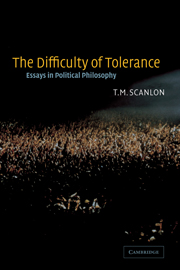Book contents
- Frontmatter
- Contents
- Acknowledgments
- Introduction
- 1 A theory of freedom of expression
- 2 Rights, goals, and fairness
- 3 Due process
- 4 Preference and urgency
- 5 Freedom of expression and categories of expression
- 6 Human rights as a neutral concern
- 7 Contractualism and utilitarianism
- 8 Content regulation reconsidered
- 9 Value, desire, and quality of life
- 10 The difficulty of tolerance
- 11 The diversity of objections to inequality
- 12 Punishment and the rule of law
- 13 Promises and contracts
- Index
2 - Rights, goals, and fairness
Published online by Cambridge University Press: 15 December 2009
- Frontmatter
- Contents
- Acknowledgments
- Introduction
- 1 A theory of freedom of expression
- 2 Rights, goals, and fairness
- 3 Due process
- 4 Preference and urgency
- 5 Freedom of expression and categories of expression
- 6 Human rights as a neutral concern
- 7 Contractualism and utilitarianism
- 8 Content regulation reconsidered
- 9 Value, desire, and quality of life
- 10 The difficulty of tolerance
- 11 The diversity of objections to inequality
- 12 Punishment and the rule of law
- 13 Promises and contracts
- Index
Summary
Critics of utilitarianism frequently call attention to the abhorrent policies that unrestricted aggregative reasoning might justify under certain possible, or even actual, circumstances. They invite the conclusion that to do justice to the firm intuition that such horrors are clearly unjustifiable one must adopt a deontological moral framework that places limits on what appeals to maximum aggregate well-being can justify. As one who has often argued in this way, however, I am compelled to recognize that this position has its own weaknesses. In attacking utilitarianism one is inclined to appeal to individual rights, which mere considerations of social utility cannot justify us in overriding. But rights themselves need to be justified somehow, and how other than by appeal to the human interests their recognition promotes and protects? This seems to be the uncontrovertible insight of the classical utilitarians. Further, unless rights are to be taken as defined by rather implausible rigid formulae, it seems that we must invoke what looks very much like the consideration of consequences in order to determine what they rule out and what they allow. Thus, for example, in order to determine whether a given policy violates the right of freedom of expression it is not enough to know merely that it restricts speech. We may need to consider also its effects: how it would affect access to the means of expression and what the consequences would be of granting to government the kind of regulatory powers it confers.
- Type
- Chapter
- Information
- The Difficulty of ToleranceEssays in Political Philosophy, pp. 26 - 41Publisher: Cambridge University PressPrint publication year: 2003
- 6
- Cited by

